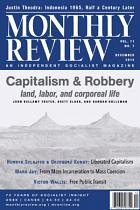December 2019 (Volume 71, Number 7)
On October 18, 2019, Bloomberg ran an article by its financial columnist Elisa Martinuzzi entitled “Which is Scarier, Climate Change or CLOs?†The article featured a picture of Greta Thunberg at the top and started off with the statement: “Call it the Greta effect. Global finance titans gathered at the annual International Monetary Fund [IMF] meetings in Washington this week identified climate change as a key risk to the long-term health of the world economy.†But wait, Martinuzzi tells us, a far bigger immediate threat to the world economy is highly leveraged corporate borrowing, which with the world recession now just around the corner, could put in jeopardy as much as $19 trillion in corporate debt, around 40 percent of total corporate borrowing, according to the IMF. The problem is that “tucked away in hidden pockets of the financial system†are an estimated $1.2 trillion in highly leveraged loans, including “collateralized loan obligations [CLOs], pools of risky loans that are bundled and sold in tranches,†now amounting to about $600 billion. All of this constitutes plenty of inflammable material with which to set off a financial firestorm. Around 80 percent of nonbank financial institutions are now considered by the IMF to be just as vulnerable as they were during the Great Financial Crisis of 2008–10, up from 60 percent less than a year ago. Martinuzzi concludes: “Which is scarier: climate change or CLOs? The fact is, both pose major global risks and demand attention. All due respect to Greta Thunberg but the corporate-debt time bomb is the more imminent threat.â€
One can only react to such a column with a deep sense of irony. Yes, CLOs and other high-risk investments endemic to monopoly-finance capital are scarier to the capitalist class in particular than is the seemingly more distant and largely noneconomic threat of climate change. Indeed, for the capitalist economy climate change may increase insurance premiums but it also opens up entirely new markets, due to the melting of the arctic ice, the burning of the Amazon, and the drying up of the world’s freshwater sources, providing new realms for the extraction and sale of fossil fuels and other natural resources. There are trillions of dollars still to be made on fossil fuels, which is what counts from the perspective of profitability. Judging simply in the terms of financial capital, then, climate change scarcely matters on the books of corporations at present. For Martinuzzi, voicing the viewpoint of capital, we are clearly spending too much time focusing on climate change as a “global risk,†as opposed to an implosion of financial capital, which poses a much more imminent threat to the capitalist economy. The ecological crisis can be treated as largely external to capitalism in that the costs can be externalized on the population and the planet in order to protect profits. A financial crisis, however, directly threatens the corporate bottom line.





